The ERC is a community based program alternative to being sent away. We provide diverse on-site programming M-F from 4-8 for up to 20 young men. It offers youth an opportunity to remain at home, develop coping skills, receive individualized supports and career development opportunities. ERC has a culinary arts program. We are expanding our on-site career development opportunities to include graphic arts and merchandising. The intent of this program is to fuel creativity and entrepreneurship for our young people and to demonstrate what having diverse streams of income can do for your financial stability.
NET Centers remains committed to the community, our clients and our staff. Many of the services NET provides are considered essential services and we remain open to serve you during these stressful times. We have converted much of what we do to a tele-health model and continue to accept referrals and admit new clients. Referral and admissions phone numbers have not changed. Our 24-hour programs remain fully operational including the ACCESS Point program at 499 North 5th Street. This program offers walk in assessment, referral and, if needed, induction for people suffering from substance use disorder.
We have postponed non-essential support such as parent training and community events. Please keep in touch with your counselor, case manager, or peer support person during these stressful times. Check the Facebook pages for NET Centers or the CUAs for regular updates and resource information. Please stay safe.
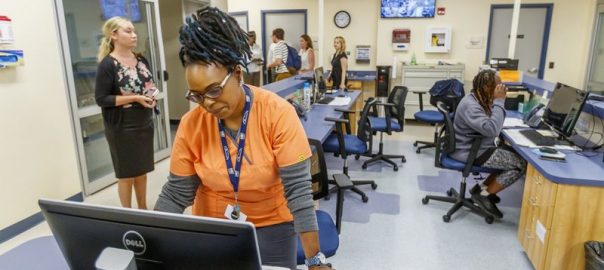
Getting a person into addiction treatment often hinges on a single moment — when they feel ready to seek help.
But for people with opioid addiction, the pain of withdrawal means that moment can pass quickly, replaced by powerful urges to use again to make the misery stop. Waiting for a treatment center to open for the day may be out of the question. Detoxing in the waiting room at a crisis center or an emergency room, or trying to navigate treatment options while dealing with nausea, vomiting, craving and cramps, can squelch the strongest desire for sobriety.
That’s why city officials hope Access Point, a 24-hour treatment center that marked its official opening Wednesday, can better serve a population often deterred by red tape and long wait times.
City officials say it’s another step toward offering treatment on demand throughout the city, long a goal of Philadelphia’s behavioral health department.
For people in addiction seeking treatment, “that window of opportunity can be very narrow,” said David T. Jones, the commissioner of the city’s Behavioral Health and Intellectual disAbility Services. “If someone says they’re ready and the system trips them up, that’s a loss for them, and for the community.”
Access Point, which is run out of the Northeast Treatment Center, an addiction treatment nonprofit on Spring Garden Street in North Philadelphia, has served 306 people in opioid addiction since its “soft opening” in April. On Wednesday, it expanded to allow access to people addicted to other substances like benzodiazepines, cocaine, and alcohol.
Patients don’t need identification to enter or to be prescribed medication-assisted treatment — another common barrier to the treatment widely accepted as the gold standard for opioid addiction.
Stays in the 15-slot unit can last no more than 23 hours; the idea, said NET director Regan Kelly, is to stabilize patients enough to place them in more long-term treatments. In the unit, patients can be dosed with suboxone, a medication-assisted treatment that is an opioid; used as directed, it staves off the cravings and withdrawal pains that send people back to using, without creating euphoric effects. From there, staffers can transfer patients to inpatient or outpatient treatment, depending on what they need. And though some choose to detox without the help of medication, Kelly and Jones said they’re working to dispel the stigma that’s often attached to medication-assisted treatment — that patients are just replacing one drug with another, explaining that this is their best chance at lasting recovery.
“People continue to die in the face of evidence that medication-assisted treatment is the gold standard,” Kelly said.
So far, the unit has not had trouble locating longer-term treatment options. Jones said that of the 12,000 medication-assisted treatment slots in Philadelphia, 3,000 are still open.
“We think we’re going to fill those slots,” Kelly said.
About 113 patients who have come through Access Point opted for medication-assisted treatment, the agency said; 84 opted against it. 171 patients were referred to inpatient treatment; 43 were able to start an outpatient program, and 53 left against medical advice. (Those numbers don’t include patients who came into the center with acute psychiatric or medical issues and had to be taken to emergency rooms or crisis centers.)
Everyone who wanted treatment has been able to access it within that 23-hour window, Kelly said. Some have entered and left for treatment within four hours, she said. And about 40 Access Point patients came directly from the four heroin encampments in Kensington, two of which were cleared a month after the center opened.
Sheila Ford, NET’s community outreach coordinator, who goes to the remaining encampments twice a week trying to persuade people to seek treatment, said it is invaluable to be able to offer immediate help — even in the middle of the night.
Alone with their thoughts, outside in the quiet, she said, is often when people are most receptive to the idea.

The bleachers at the MLK Recreation Center at 21st and Cecil B. Moore Avenue were packed as community members came out to see the 3rd annual Fall Classic All Star Game. The exhibition game, celebrating the start of Juvenile Justice Week, featured youth from the Philadelphia Providers’ League playing against an all-star team of juvenile probation officers.
Inside the rec center, volunteers collected candy for a safe, neighborhood Halloween event (see sidebar on Page 2) and tables were set up to provide youth and community members with information about different services and programs. Among those represented were the Defender Association of Philadelphia, the Police Athletic League, the Philadelphia Technician Training Institute and Northeast Treatment Centers.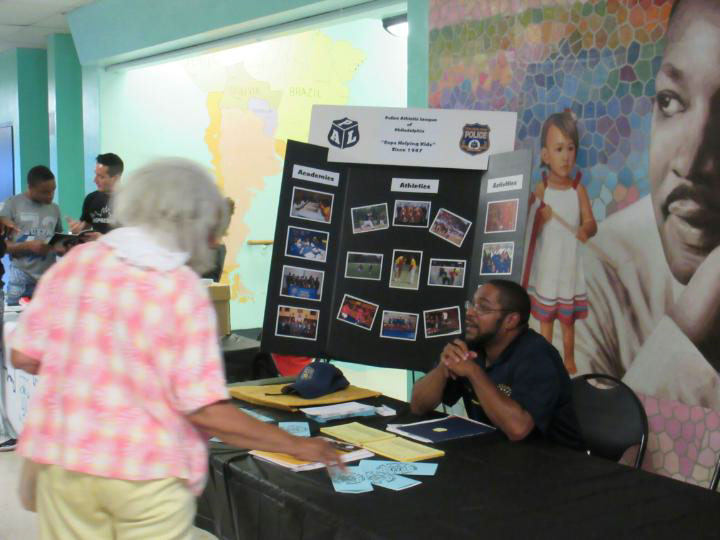
Leonard Thompson, who used to play basketball in the MLK Recreation Center, was now there on behalf of Philadelphia Technician Training Institute. Thompson applauded the informal nature of the event. “I think it’s fantastic,” Thompson said. “It builds connections. It builds relationships.”
Children from the community had a shoot-around and socialized before making way for the all-star teams to take the court for pregame warm-ups. The feeling in the room was optimistic, if not a bit competitive.
“They’re already starting to talk some trash,” Adam Serlin said with a smile.
Serlin is the Director of Court Services with Northeast Treatment Centers, one of the organizers of the event. Of the many organizations involved, many are helping kids in the juvenile justice system stay in the community and at home instead of placement facilities.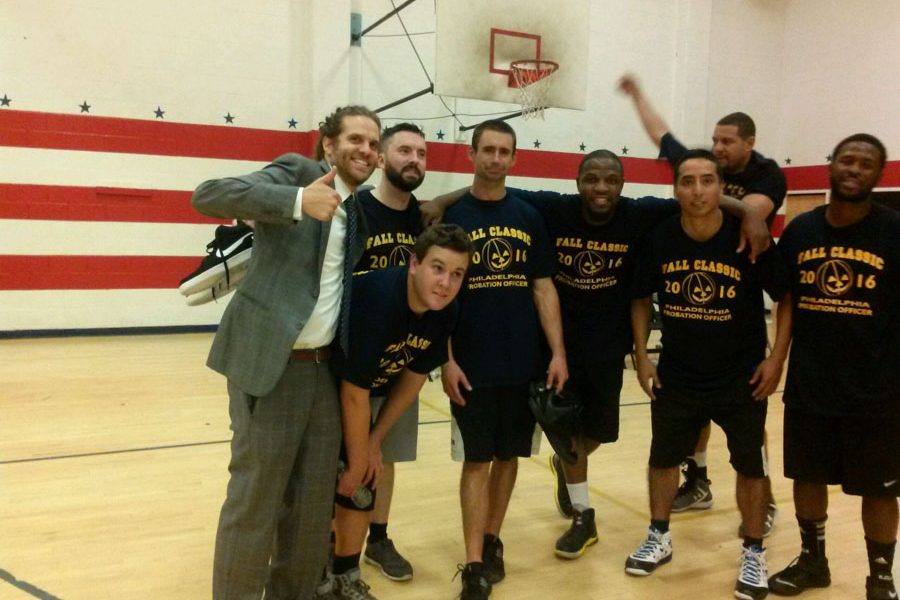
Before long, the ball was tipped and the youth tried to take advantage of age being on their side with a mixture of full court press defense and a wide-open fast-break offense. By halftime, they had built a 14 point lead.
Halftime allowed community members to mingle with judges and other city officials and a dance routine was performed by the North Philly Bearcats.
An unexpected highlight came during the second half when the Special Ops Drumline, who practices at MLK, took the court for an impromptu and rousing performance. The thunderous drums echoed through the gym as numerous spectators pulled out their phones to record the moment.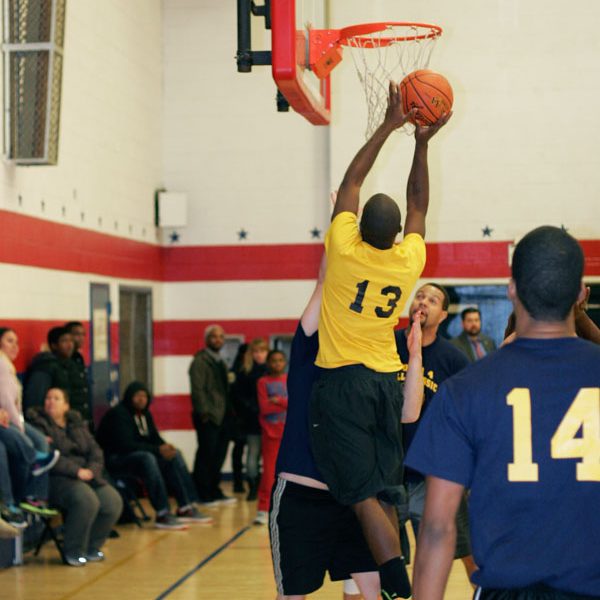 The lead elapsed in the second half as the game went back and forth down the stretch. With 12.5 seconds left in the game, the probation officers inbounded the ball, down by a score of 52-49. One of the officers got off a decent look as the seconds ticked away, but the shot didn’t drop as the youths took a 2-1 lead in the all-star series.
The lead elapsed in the second half as the game went back and forth down the stretch. With 12.5 seconds left in the game, the probation officers inbounded the ball, down by a score of 52-49. One of the officers got off a decent look as the seconds ticked away, but the shot didn’t drop as the youths took a 2-1 lead in the all-star series.
Both teams lined up to shake hands and share laughs as the annual trophy was brought to half court.
According to officials, Showing the probation officers in a different light was one of the many reasons to organize the game. “This informal interaction hopefully reveals to our young people that we are all humans like them,” said Angel Flores, Deputy District Attorney for the Juvenile Division. “And that we are all working together to try to better their situations.
A drive to show citizens that agencies were there to help them and their families was a consistent theme of the night. “We want people to call us and engage us,” said Jose Loya, Communication and Development Manager with the Defender Association of Philadelphia.
The association was on hand with informational pamphlets and representatives educating attendees on how they can help, something Loya says is much easier when they lose the shirt and tie and get out into communities. “We’re also recognizing that there are barriers to services, and I think one of the great things NET is doing is trying to tear down some of those barriers,” Loya said.
The collaboration between the juvenile court system, public defender’s office and the many other organizations at work that night are a sign to Adam Serlin that the city is moving in the right direction. “Everyone’s kind of working together,”Serlin said later. “I do think in Philadelphia we have a pretty progressive juvenile justice movement.”
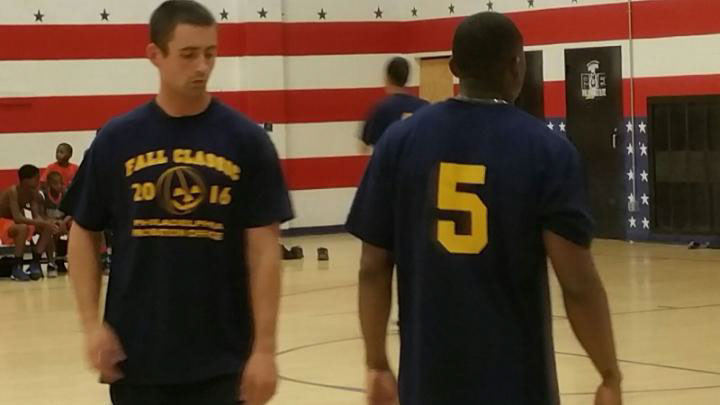 Serlin cited research that showed that sending juveniles to placement facilities is often not best for adolescents. It may not be best for the city either as the average cost of placement nationwide is approximately $88,000 per child, per year.
Serlin cited research that showed that sending juveniles to placement facilities is often not best for adolescents. It may not be best for the city either as the average cost of placement nationwide is approximately $88,000 per child, per year.
A number of kids participating in the Fall Classic All Star game are currently enrolled in a program that gives kids in the juvenile system a chance to stay in their communities. Northeast Treatment Center’s Evening Reporting Center is a six month program that allows kids to report daily from 4 to 8PM as an alternative to placement facilities. The center includes cognitive behavioral therapy, financial literacy classes, and career training among other programs. There is even a recording studio on the premises.
Serlin said that the program gives a second chance for mostly non violent offenders, many who are in trouble due to technicalities or probation violations. “We already know that teenagers are impulsive,” Serlin said. “But that doesn’t mean that they’re bad kids or bad people.”
The Evening Reporting Center and Fall Classic All Star game are just two of the many reasons Serlin is excited to about the state of the city’s outlook. “It’s an exciting time to work in juvenile justice system here.”
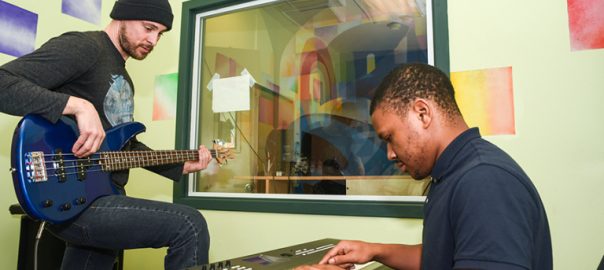

The young boys at the Evening Reporting Center are writing their own soundtrack in the juvenile justice system.
“At ERC we be learning/ getting some jobs in return,” rings out through the speakers in the sound booth in the recording studio, which sets up Lee’s verse. “Here they teach us about real life/ not ‘x to the two’/ they should come to my school/ teach a lesson or two.”
Just hours ago, Lee was released from house arrest. At 4 p.m., he promptly arrived at the Northeast Treatment Center at Second and Norris streets – this time, on his own accord.
For the past six months, Lee has been one of the adjudicated delinquent youths under the community-based supervision of the Evening Reporting Center. He’s been working with his peers to put together a theme song for the ERC and voluntarily came to the music program today to use the third-floor recording studio.
The kids at ERC are all given a second chance. Instead of being sent away to a juvenile detention center, they are placed under supervision in their communities.
After school lets out, youths arrive to the court-mandated, alternative placement program. They are supervised between peak crime hours, 4-8 p.m., then return home – their GPS ankle monitors make sure of it.
Here, they learn to cook meals for one another, to plan finances and to develop social connections through music, art and sports. The creative alternative to juvenile detention “works to view the whole child,” says Adam Serlin, ERC program director and former musician.
“It’s not always what the child did. It’s what has been done to the child,” Serlin says. At the ERC, he says they first ask, “What are the ways we can address the deeper causes for behavior?”
In other words, the program pays special attention to rehabilitation instead of punishment.
Through the juvenile justice system, the ERC works with the Department of Human Services and Philadelphia Family Courts to provide community supervision during the length of house arrest. To provide music programming as a form of creative expression, the ERC is partnered with the nonprofit Limelight Arts.
“We give them interests they can connect to so moving forward, they’ll have some new passions that can prevent issues or recidivation in the future,” Serlin says.
Co-founders Frank Machos and Avery Coffee provide ongoing opportunities for the at-risk youths to build tangible skills in music. Machos utilizes his role as the director of music education for the Philadelphia School District to help secure equipment for the ERC and place kids who complete the program into school music programs after the end of their sentence.
His partner, Coffee, visits the program every Wednesday to provide hands-on music instruction. For Coffee, watching kids engage with unfamiliar instruments as an act of creative expression is what makes this program special.
“They get to have a voice,” Coffee says. “In this system, you’re getting talked down to constantly. You’re constantly surrounded by adults who don’t understand your situation. They aren’t looking you in the eye. They’re writing stuff down and you’re getting passed down the line. In here, you get to say what’s on your mind. This is your outlet. You’re not just a number.”
It was Serlin’s goal to create pro-social programs that would allow his kids to feel heard and find a productive way to let off steam.
“Our kids are not different than any other kid,” Serlin says. “A lot of times they just have fewer programs to go to and fewer things to do. That typically leads to trouble.”
Serlin identified music as a transferrable skill that can be carried anywhere and used as a coping mechanism if the child has issues at home.
“Music helps me express myself because I can get stuff off my chest,” Lee says. “If I’m having an issue with something, I can rap it and it will relieve it a little bit.”
The measurable successes of the Evening Reporting Center in its pilot year have allowed the branch to expand from a pre-adjudicatory program that supervised youths awaiting trial, into a six month post-adjudicatory program that serves as a true alternative to juvenile detention.
According to the DHS, in 2014, 82 percent of youths placed in Philadelphia ERCs were successful in exiting the juvenile justice system.
Fajr, a 17-year-old alumnus from West Philadelphia, was one of them. The skills he learned in the music program landed him internships with Jr. Music Executives and PhillyCAM before being hired to measure data by the ERC.
“If you’re interested, everything is in your reach,” Fajr says as he sits behind a keyboard in the live music room, mindlessly pressing keys as he speaks. “They’re not asking you to do anything except play music. I was blind to everything when I came in here. They presented me with ideas that worked in my own head.”
The ultimate goal of the Evening Reporting Center is to provide at-risk youths with skills for rehabilitation. They aren’t looking to make a star of every kid that walks in the studio. Instead, they are focused on the healing power of music and the potential of a second chance.
“Even if it’s just making the process a little more palatable throughout, making their journey through the juvenile justice system something that is a little less terrifying, that’s a success,” Serlin says.
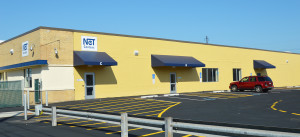
There’s been a dramatic increase in the number of drug related overdose deaths in the Philadelphia region. Friday the city opened a much needed rehab center.
“Not in my neighborhood,” that’s what you usually hear about drug clinics. Philadelphia’s Department of Behavioral Health worked for years with the community to overcome stigmas and prove that they can be good for business.
Tom Qualters is happy to give tours of the new NET Center for drug rehabilitation that’s opening in the upper Northeast. Tom says, “It gives people a second chance, it shows people we are not monsters.”
Tom who has three children, says he was a drug addict and a nurse for 17 years and that a NET Center saved his life. Now he works for the new one in the Northeast. It’s a neighborhood where opiate addiction is exploding. “It’s everywhere not just in the city, in the burbs, it’s everywhere.” Tom says.
That’s not near enough, according to Roland Lamb, Director of the Office of Addiction Services with the Department of Behavioral Health. “If you think of cancer, diabetes or heart disease folks who suffer those diseases have a 7 out of 10 chance of getting treatment they need, when you consider addiction 1 in 10 have a chance of getting treatment they need.” Roland says.
The new NET Center on State Road is not in a neighborhood, but there was still plenty of community opposition, including from the next door neighbor Sweet Lucy, a barbeque restaurant. Brooke Higgins says they were concerned the area would become dangerous, with illegal activities. But she says she was finally convinced the NET Center would take care of security and its clients. Brooke says, “I think they’ll be great neighbors and we’re going to be good neighbors and we’ll have a good relationship.”
Tom has been off drugs for seven years, as a constant reminder of the hell he lived he has a tattoo of the Grim Reaper. He says he feels lucky that he got a second chance.
The NET Center worked with the Holmesburg Civic Association to create a community advisory board to make sure that any neighborhood issues could be addressed.
The NET Center provides a variety of mental health services, including a comprehensive drug rehab program.